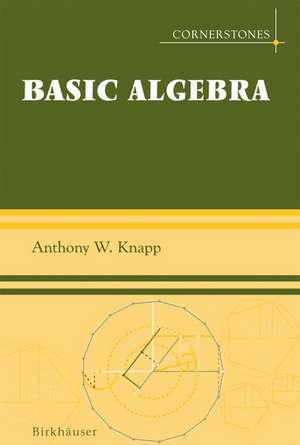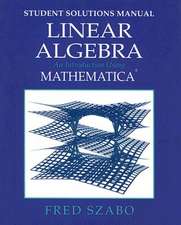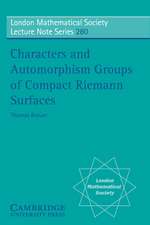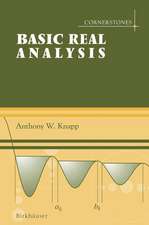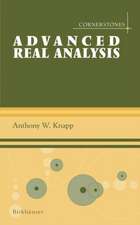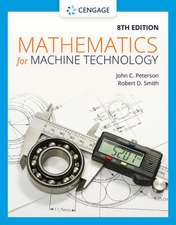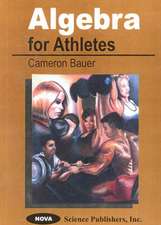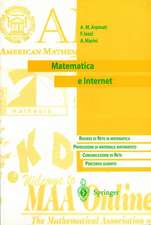Basic Algebra: Cornerstones
Autor Anthony W. Knappen Limba Engleză Hardback – 28 sep 2006
The exposition proceeds from the particular to the general, often providing examples well before a theory that incorporates them. The presentation includes blocks of problems that introduce additional topics and applications to science and engineering to guide further study. Many examples and hundreds of problems are included, along with a separate 90-page section giving hints or complete solutions for most of the problems.
Basic Algebra presents the subject matter in a forward-looking way that takes into account its historical development. It is suitable as a text in a two-semester advanced undergraduate or first-year graduate sequence in algebra, possibly supplemented by some material from Advanced Algebra at the graduate level. It requires of the reader only familiarity with matrix algebra, an understanding of the geometry and reduction of linear equations, and an acquaintance with proofs.
Din seria Cornerstones
- 18%
 Preț: 857.36 lei
Preț: 857.36 lei - 15%
 Preț: 530.42 lei
Preț: 530.42 lei -
 Preț: 56.07 lei
Preț: 56.07 lei - 15%
 Preț: 590.63 lei
Preț: 590.63 lei - 18%
 Preț: 809.25 lei
Preț: 809.25 lei - 5%
 Preț: 351.06 lei
Preț: 351.06 lei - 5%
 Preț: 351.02 lei
Preț: 351.02 lei -
 Preț: 412.19 lei
Preț: 412.19 lei -
 Preț: 453.01 lei
Preț: 453.01 lei - 15%
 Preț: 760.94 lei
Preț: 760.94 lei - 15%
 Preț: 670.64 lei
Preț: 670.64 lei - 15%
 Preț: 598.50 lei
Preț: 598.50 lei - 15%
 Preț: 541.72 lei
Preț: 541.72 lei - 15%
 Preț: 607.01 lei
Preț: 607.01 lei - 15%
 Preț: 647.40 lei
Preț: 647.40 lei - 15%
 Preț: 509.24 lei
Preț: 509.24 lei - 9%
 Preț: 748.81 lei
Preț: 748.81 lei
Preț: 915.32 lei
Preț vechi: 1116.23 lei
-18% Nou
Puncte Express: 1373
Preț estimativ în valută:
175.15€ • 183.33$ • 145.78£
175.15€ • 183.33$ • 145.78£
Carte tipărită la comandă
Livrare economică 31 martie-14 aprilie
Preluare comenzi: 021 569.72.76
Specificații
ISBN-13: 9780817632489
ISBN-10: 0817632484
Pagini: 717
Ilustrații: XXV, 735 p. 46 illus.
Dimensiuni: 155 x 235 x 39 mm
Greutate: 1.14 kg
Ediția:2006
Editura: Birkhäuser Boston
Colecția Birkhäuser
Seria Cornerstones
Locul publicării:Boston, MA, United States
ISBN-10: 0817632484
Pagini: 717
Ilustrații: XXV, 735 p. 46 illus.
Dimensiuni: 155 x 235 x 39 mm
Greutate: 1.14 kg
Ediția:2006
Editura: Birkhäuser Boston
Colecția Birkhäuser
Seria Cornerstones
Locul publicării:Boston, MA, United States
Public țintă
ResearchCuprins
Preliminaries about the Integers, Polynomials, and Matrices.- Vector Spaces over ?, ?, and ?.- Inner-Product Spaces.- Groups and Group Actions.- Theory of a Single Linear Transformation.- Multilinear Algebra.- Advanced Group Theory.- Commutative Rings and Their Modules.- Fields and Galois Theory.- Modules over Noncommutative Rings.
Recenzii
From the reviews:
Finally, the author's notorious masterly style of writing, which stands out by its high degree of clarity, elegance, refinement, and accuracy, also rules over this newest textbook of his, which is very likely to become one of the great standard texts in algebra for generations. —Zentralblatt Math
``Anthony W. Knapp Basic Algebra aims to teach the student algebra in a somewhat different way than is the norm. Together with its sequel, Advanced Algebra, the book proposes to take an aspiring mathematician from his first exposure to algebra proper, right after calculus, through his graduate training in algebra -- and a bit further...
``To use Basic Algebra in a standard undergraduate curriculum would entail spreading the material over several semesters, since the book can be used for linear algebra, group theory (Chapter IV is a gem!), rings and fields, Galois theory, a second course in group theory, and even a course on modules.
``Basic Algebra is a very interesting and well-written book, and is indeed well suited for the approach to algebra the author intends, and, for that matter, usable for commonplace approaches as well." —MAA Reviews
"This is a basic textbook in abstract algebra suitable for a first-year graduate algebra course or perhaps a rather challenging upper level undergraduate course. … The appendices contain some basic set theory. … There are many interesting problems, in which a considerable amount of additional material is developed. In particular the theme of coding theory is pursued through many of the chapter exercises and topics such as MacWilliams identity and BCH codes are broached." (Ronald Solomon, Mathematical Reviews, Issue 2007 e)
“This book is written as a textbook for students who are learning algebra for the first time. Much of the material corresponds to the contents of a usual algebra course. … numerousfurther topics are included which go beyond the level of an undergraduate or even first year graduate student.” (H. Mitsch, Monatshefte für Mathematik, Vol. 156 (4), April, 2009)
Finally, the author's notorious masterly style of writing, which stands out by its high degree of clarity, elegance, refinement, and accuracy, also rules over this newest textbook of his, which is very likely to become one of the great standard texts in algebra for generations. —Zentralblatt Math
``Anthony W. Knapp Basic Algebra aims to teach the student algebra in a somewhat different way than is the norm. Together with its sequel, Advanced Algebra, the book proposes to take an aspiring mathematician from his first exposure to algebra proper, right after calculus, through his graduate training in algebra -- and a bit further...
``To use Basic Algebra in a standard undergraduate curriculum would entail spreading the material over several semesters, since the book can be used for linear algebra, group theory (Chapter IV is a gem!), rings and fields, Galois theory, a second course in group theory, and even a course on modules.
``Basic Algebra is a very interesting and well-written book, and is indeed well suited for the approach to algebra the author intends, and, for that matter, usable for commonplace approaches as well." —MAA Reviews
"This is a basic textbook in abstract algebra suitable for a first-year graduate algebra course or perhaps a rather challenging upper level undergraduate course. … The appendices contain some basic set theory. … There are many interesting problems, in which a considerable amount of additional material is developed. In particular the theme of coding theory is pursued through many of the chapter exercises and topics such as MacWilliams identity and BCH codes are broached." (Ronald Solomon, Mathematical Reviews, Issue 2007 e)
“This book is written as a textbook for students who are learning algebra for the first time. Much of the material corresponds to the contents of a usual algebra course. … numerousfurther topics are included which go beyond the level of an undergraduate or even first year graduate student.” (H. Mitsch, Monatshefte für Mathematik, Vol. 156 (4), April, 2009)
Textul de pe ultima copertă
Basic Algebra and Advanced Algebra systematically develop concepts and tools in algebra that are vital to every mathematician, whether pure or applied, aspiring or established. Together, the two books give the reader a global view of algebra and its role in mathematics as a whole.
Key topics and features of Basic Algebra:
*Linear algebra and group theory build on each other continually
*Chapters on modern algebra treat groups, rings, fields, modules, and Galois groups, with emphasis on methods of computation throughout
*Three prominent themes recur and blend together at times: the analogy between integers and polynomials in one variable over a field, the interplay between linear algebra and group theory, and the relationship between number theory and geometry
*Many examples and hundreds of problems are included, along with a separate 90-page section giving hints or complete solutions for most of the problems
*The exposition proceeds from the particular to the general, often providing examples well before a theory that incorporates them; includes blocks of problems that introduce additional topics and applications for further study
*Applications to science and engineering (e.g., the fast Fourier transform, the theory of error-correcting codes, the use of the Jordan canonical form in solving linear systems of ordinary differential equations, and constructions of interest in mathematical physics) appear in sequences of problems
Basic Algebra presents the subject matter in a forward-looking way that takes into account its historical development. It is suitable as a text in a two-semester advanced undergraduate or first-year graduate sequence in algebra, possibly supplemented by some material from Advanced Algebra at the graduate level. It requires of the reader only familiarity with matrix algebra, an understanding of the geometry and reduction of linear equations, and an acquaintance with proofs.
Key topics and features of Basic Algebra:
*Linear algebra and group theory build on each other continually
*Chapters on modern algebra treat groups, rings, fields, modules, and Galois groups, with emphasis on methods of computation throughout
*Three prominent themes recur and blend together at times: the analogy between integers and polynomials in one variable over a field, the interplay between linear algebra and group theory, and the relationship between number theory and geometry
*Many examples and hundreds of problems are included, along with a separate 90-page section giving hints or complete solutions for most of the problems
*The exposition proceeds from the particular to the general, often providing examples well before a theory that incorporates them; includes blocks of problems that introduce additional topics and applications for further study
*Applications to science and engineering (e.g., the fast Fourier transform, the theory of error-correcting codes, the use of the Jordan canonical form in solving linear systems of ordinary differential equations, and constructions of interest in mathematical physics) appear in sequences of problems
Basic Algebra presents the subject matter in a forward-looking way that takes into account its historical development. It is suitable as a text in a two-semester advanced undergraduate or first-year graduate sequence in algebra, possibly supplemented by some material from Advanced Algebra at the graduate level. It requires of the reader only familiarity with matrix algebra, an understanding of the geometry and reduction of linear equations, and an acquaintance with proofs.
Caracteristici
Comprehensive and self-contained text on Basic Algebra which is supplemented by Advanced Algebra Each chapter includes hundreds of examples and problems, and a final chapter contains hints and solutions for most of the problems Key topics and features include: the notion of vector spaces, the theory of linear transformations, bilinear forms, classical linear groups, and multilinear algebra, modern algebra treat groups, rings, fields, modules, and Galois theory, including infinite Galois groups
